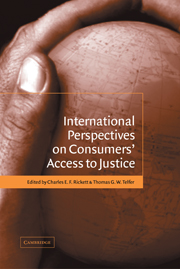Book contents
- Frontmatter
- Contents
- List of contributors
- Preface
- Table of cases
- Table of statutes
- 1 Consumers' access to justice: an introduction
- Part I Perspectives on consumers' access to justice
- Part II Issues in contract and tort
- Part III Services and the consumer
- 7 Services of general interest and European private law
- 8 The new Financial Ombudsman Service in the United Kingdom: has the second generation got it right?
- 9 Economic appraisals of rulemaking in the new society: why, how, and what does it mean? The challenge for the consumer
- Part IV Consumer bankruptcy law
- Part V Procedure and process issues
- Part VI Conflict of laws issues
- Index
8 - The new Financial Ombudsman Service in the United Kingdom: has the second generation got it right?
from Part III - Services and the consumer
Published online by Cambridge University Press: 11 July 2009
- Frontmatter
- Contents
- List of contributors
- Preface
- Table of cases
- Table of statutes
- 1 Consumers' access to justice: an introduction
- Part I Perspectives on consumers' access to justice
- Part II Issues in contract and tort
- Part III Services and the consumer
- 7 Services of general interest and European private law
- 8 The new Financial Ombudsman Service in the United Kingdom: has the second generation got it right?
- 9 Economic appraisals of rulemaking in the new society: why, how, and what does it mean? The challenge for the consumer
- Part IV Consumer bankruptcy law
- Part V Procedure and process issues
- Part VI Conflict of laws issues
- Index
Summary
Introduction
While the new Financial Ombudsman Service (‘the FOS’) in the United Kingdom owes much to its predecessors, its size and scope mean that we are witnessing the birth of a new form of the ombudsman remedy. The FOS brings together eight existing complaints schemes and will be organised according to product, rather than provider, as has been the case with the existing ombudsman schemes. The stated rationale behind the political decision to establish a single ‘one-stop’ organisation, taken evidently at ministerial level, is to reduce confusion (though the empirical evidence to support this is conspicuous by its absence) and possible duplication as far as consumers are concerned, while responding to the blurring of traditional distinctions between the industry sectors, as firms are restructured and products packaged together. The move to a statutory ombudsman with overarching responsibilities, to replace the existing fragmented patchwork quilt of mostly voluntary schemes, was almost inevitable once the discredited, largely self-regulatory regime in the financial services sector was replaced by a single statutory regulator in the shape of the Financial Services Authority (‘the FSA’). There were other dynamics at work here, too, and we need to trace, briefly, the history of the ombudsman remedy in the United Kingdom and also to locate the present developments in the context of the Blair Government's Modernising Justice project.
- Type
- Chapter
- Information
- International Perspectives on Consumers' Access to Justice , pp. 167 - 195Publisher: Cambridge University PressPrint publication year: 2003
- 1
- Cited by



